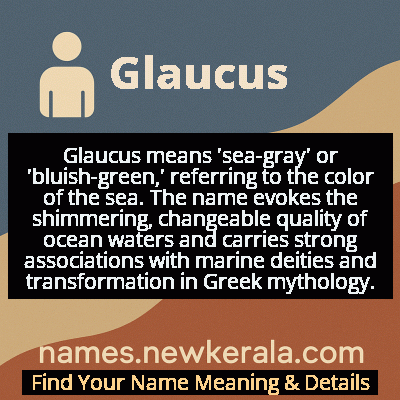Glaucus Name Meaning & Details
Origin, Popularity, Numerology Analysis & Name Meaning of Glaucus
Discover the origin, meaning, and cultural significance of the name GLAUCUS. Delve into its historical roots and explore the lasting impact it has had on communities and traditions.
Name
Glaucus
Gender
Male
Origin
Greek
Lucky Number
3
Meaning of the Name - Glaucus
Glaucus means 'sea-gray' or 'bluish-green,' referring to the color of the sea. The name evokes the shimmering, changeable quality of ocean waters and carries strong associations with marine deities and transformation in Greek mythology.
Glaucus - Complete Numerology Analysis
Your Numerology Number
Based on Pythagorean Numerology System
Ruling Planet
Jupiter
Positive Nature
Optimistic, inspirational, and creative.
Negative Traits
Scattered, exaggerating.
Lucky Colours
Yellow, gold, purple.
Lucky Days
Thursday.
Lucky Stones
Yellow sapphire.
Harmony Numbers
1, 2, 9.
Best Suited Professions
Arts, writing, communication.
What People Like About You
Creativity, optimism.
Famous People Named Glaucus
Glaucus of Anthedon
Sea deity
Transformed into immortal sea god, known for prophecy and marine wisdom
Glaucus (son of Minos)
Prince of Crete
Resurrected after drowning, later became king through miraculous healing
Glaucus of Potniae
Athletic hero
Famous for his death and resurrection story involving magical herbs
Glaucus (son of Sisyphus)
Mythological king
Father of Bellerophon, known for his tragic death by horses
Name Variations & International Equivalents
Click on blue names to explore their detailed meanings. Gray names with will be available soon.
Cultural & Historical Significance
The name also appears in the Iliad as Glaucus of Lycia, where he participates in the famous armor exchange with Diomedes—a scene that exemplifies the Greek concept of xenia (guest-friendship) and the importance of ancestral ties. This multiplicity of Glaucus figures across different myths suggests the name carried substantial cultural weight, representing both the unpredictable nature of fate and the potential for mortal transcendence. The recurring marine associations connect Glaucus to Greek maritime culture and their understanding of the sea as both provider and destroyer, making the name a rich tapestry of Greek cultural values and beliefs.
Extended Personality Analysis
Individuals bearing the name Glaucus are often characterized by their deep connection to transformation and adaptability, reflecting the mythological figures who shared this name. They typically possess an intuitive understanding of hidden truths and demonstrate remarkable resilience when facing life's challenges. Like the sea deity who transformed after eating magical herbs, Glaucus-named individuals often experience significant personal evolution throughout their lives, showing an ability to reinvent themselves while maintaining core integrity. They tend to be drawn to mysteries, healing professions, or fields involving water and environmental conservation.
Their personality often blends profound wisdom with a restless spirit, mirroring the sea's dual nature of calm serenity and powerful storms. Glaucus individuals are frequently introspective, possessing deep emotional intelligence and a strong connection to natural forces. They may exhibit a tendency toward helping others navigate difficult transitions, drawing from their own experiences of transformation. However, they might also struggle with feelings of being caught between different worlds or identities, and could face challenges in maintaining stable relationships due to their evolving nature and deep-seated need for personal growth and discovery.
Modern Usage & Popularity
In contemporary naming practices, Glaucus remains an extremely rare choice, primarily confined to classical scholars, mythology enthusiasts, and families with strong Greek heritage. The name's usage is almost exclusively within academic or culturally specific circles rather than mainstream society. There has been a minor resurgence of interest due to popular mythology-based media and literature, though it remains well outside conventional naming trends. Modern parents choosing this name typically value its deep historical roots, unique sound, and powerful mythological associations over current naming popularity. The name is more likely to appear in literary works, academic contexts, or as a middle name rather than as a common given name. Its complexity and strong classical connections make it a distinctive choice that signals intellectual curiosity and appreciation for ancient cultural traditions.
Symbolic & Spiritual Meanings
Symbolically, Glaucus represents the profound concept of metamorphosis—not merely physical change but deep spiritual transformation and the acquisition of higher wisdom through extraordinary experiences. The name embodies the mysterious depths of consciousness, much like the ocean depths inhabited by the sea deity Glaucus. It symbolizes the boundary between known and unknown realms, carrying connotations of hidden knowledge, prophetic insight, and the cyclical nature of death and rebirth. Glaucus also represents the integration of opposing forces: mortal and divine, human and nature, temporary and eternal. The name's marine associations connect it to themes of emotional depth, intuition, and the unconscious mind, while its transformation narratives symbolize the human capacity for radical personal evolution and the discovery of one's true nature through challenging experiences.

